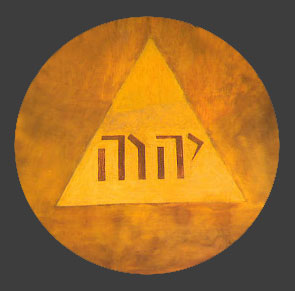
Tetragrammaton
Francisco Goya, 1772

IHS Monogram
Gesù Church, Rome
My dear friends,
The Holy Name of Jesus is celebrated in the period between January 1 and January 3 by various Christian denominations. Let us take this opportunity to explore passages from the Bible that speak to us of the power, significance, and sacredness of Names, particularly the Holy Names of God and Jesus.
In Numbers 6:22-27, we encounter the "Aaronic Blessing":
Thus you shall bless the Israelites: You shall say to them,
The LORD bless you and keep you;
the LORD make his face to shine upon you, and be gracious to you;
the LORD lift up his countenance upon you, and give you peace.
So they shall put my name on the Israelites, and I will bless them.
Here, we are presented with the Tetragrammaton - YHVH (יהוה, the Hebrew letters "Yod, Heh, Vav, Heh)", translated in most English Bibles as "the LORD". This name is a central concept in Judaism and carries significant spiritual and theological weight. It is the distinctive personal name of the God of Israel:
"If I come to the Israelites and say to them, 'The God of your ancestors has sent me to you,'
and they ask me, 'What is his name?' what shall I say to them?"
God said to Moses, "I AM WHO I AM."
He said further, "Thus shall you say to the Israelites, 'I AM has sent me to you.'"
- Exodus 3:14-15
This name is considered so sacred in Jewish tradition that it is never pronounced as it is written. Instead, other names or titles for God, like "Adonai" or "HaShem," are used in prayer and religious reading. This name is not just a mere identification; it is an embodiment of the divine essence, of the unfathomable energy that pervades all of existence.
When the Israelites are blessed in this name, it is not just a wish, but an invocation of the Divine Presence within and amongst them. This name, YHVH, becomes a conduit for the divine blessings of protection, grace, and peace.
The significance of YHVH lies in its representation of a God who is both immanent and transcendent — deeply personal and involved in the world, yet beyond our complete understanding. This paradox encourages humility and awe in the face of the divine and invites a continual exploration of faith.
In Luke 2:21, we find another Name of significance, the Name of Jesus. This Name, given by an angel before his conception, signifies his mission and identity. It is derived from ιεσωυσ, the Greek transliteration of the Hebrew "Yehoshua", meaning 'YHVH saves,' pointing to his role as the savior, the one who delivers humanity from suffering. Just like the Tetragrammaton, the Name of Jesus is not a mere label but an embodiment of his teachings of love, compassion, forgiveness, and salvation.
These two Names, YHVH and Jesus, are related in that they both serve as bridges between the human and divine realms. They both act as reminders and guides, illuminating our path to realizing our inherent divinity and interconnection with all beings. The name Jesus, as the incarnation of YHVH, signifies the divine presence in the human realm, reinforcing the principle that the sacred and the ordinary interpenetrate each other.
For our own spiritual practice and growth, these names serve as powerful tools. Invoking them with mindfulness, we can align ourselves with the divine qualities they represent. They can be seen as mantras, sacred utterances that, when used consciously, help to clear the mind, open the heart, and foster a sense of unity with the Divine.
But beyond repetition and invocation, the true value of these Holy Names lies in their ability to inspire us to embody the qualities they represent. To invoke the name of YHVH is to strive for compassion, understanding, and peace. To invoke the name of Jesus is to commit ourselves to love, forgiveness, and the alleviation of suffering.
These names are often used in the Christian versions of mandalas - visible representations of invisible truths. The Tetragrammaton may appear inside a triangle to remind us of the three principal aspects of the Divine - Creator, Redeemer and Sustainer. The triangle may be embedded in a circle to invoke the perfection of these qualities:
- Matthew 5:48
Similarly, the "IHS" monogram (the capitalized first three letters of the Greek ιεσωυσ) is often represented in a sunburst to remind us of these words:
The light shines in the darkness, and the darkness did not overcome it.
- John 1:3b-5
Let us use these Holy Names as calls to awaken the divine potential within us. Let us strive to embody the qualities these Names represent, for in doing so, we become beacons of love, compassion, and peace, illuminating the world with our actions and presence. This is the real spiritual growth, and this is the true celebration of the Holy Names.